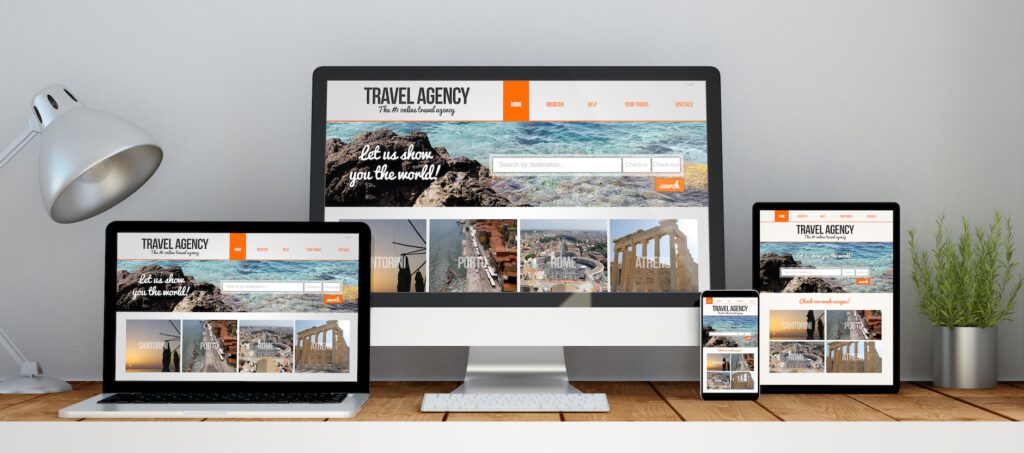Taking Your Business Online
Having an online presence is essential for any business.
September 27, 2022 | 7 min read

Taking your business online can be a great way to expand your reach and potentially increase your revenue. In today's digital age, having an online presence is essential for any business, no matter what industry you're in. In this blog post, we'll go over some steps you can take to get your business online and start reaching new customers.
Choose a Domain Name
First and foremost, you'll need to decide on a domain name for your website. This should be something that is easy to remember and reflects your brand. Once you've settled on a domain name, you can register it with a domain name registrar.
Some examples of domain name registrars include GoDaddy, Namecheap, and Network Solutions. Here are the links to their websites:
- GoDaddy: https://www.godaddy.com/
- Namecheap: https://www.namecheap.com/
- Network Solutions: https://www.networksolutions.com/
It's important to do your research and compare the features and pricing offered by different registrars before choosing one. Keep in mind that the cost of registering a domain name can vary depending on the registrar and the type of domain you choose (e.g., .com, .org, .net, etc.).
How to Select a Web Hosting Provider
Next, you'll need to choose a web hosting provider. This is the company that will host your website and make it accessible to users on the internet. There are many different web hosting providers to choose from, so do your research and pick one that offers the features and support you need. Wonder Media Group also offers our own internal hosting as an option.
Some examples of web hosting providers include Bluehost, HostGator, and InMotion Hosting. Here are the links to their websites:
- Bluehost: https://www.bluehost.com/
- HostGator: https://www.hostgator.com/
- InMotion Hosting: https://www.inmotionhosting.com/
As with domain name registrars, it's important to do your research and compare the features and pricing offered by different web hosting providers before choosing one. Some factors to consider include the amount of storage and bandwidth included in the plan, the level of technical support offered, and the type of hosting platform (e.g., shared, VPS, dedicated) that is best suited to your needs.
Create a Website - Web Design and Development
Once you have your domain name and web hosting set up, it's time to create your website. You can do this yourself using a website builder, or you can hire a professional web designer to create a custom website for you. Your website should be easy to navigate and provide information about your business, including your products or services, contact information, and any other relevant details.
Establish a Social Media Presence
In addition to your website, you'll also want to establish a presence on social media. This can help you connect with customers, share updates about your business, and promote your products or services. Choose the social media platforms that are most relevant to your audience and use them to engage with your customers and build a community around your brand.
Drive Traffic and Convert Visitors into Customers
Once your online presence is established, you'll need to focus on driving traffic to your website and converting visitors into customers. This can be done through search engine optimization (SEO), paid advertising, and other digital marketing strategies.
Taking your business online can be a great way to expand your reach and increase your revenue. By registering a domain name, choosing a web hosting provider, creating a website, establishing a social media presence, and using digital marketing strategies, you can effectively bring your business online and start reaching new customers
If you want to take your business online, here are 5 steps you can follow to get started:
-
Identify your target audience and define your niche.
This will help you create a website and marketing strategy that is tailored to your specific customer base.
-
Create a website for your business.
Your website should include information about your products or services, contact information, and any other relevant information. You may want to consider hiring a web designer to help you create a professional-looking website.
-
Set up a payment system.
If you plan to sell products or services on your website, you will need to set up a payment system so that customers can easily purchase from you. This could involve using a third-party payment processor, such as PayPal, or setting up a merchant account with a bank.
-
Promote your website.
Once your website is up and running, you will need to promote it to attract customers. This can involve creating social media accounts for your business, running online ads, and optimizing your website for search engines.
-
Provide excellent customer service.
Good customer service is essential for any business, and it is especially important when you are operating online. Respond to customer inquiries quickly, and make sure that you are always available to answer questions or address any concerns they may have.
Overall, taking your business online can be a great way to reach a wider audience and grow your customer base. It's important to carefully plan and execute your online strategy, and to constantly be looking for ways to improve your website and customer service.




